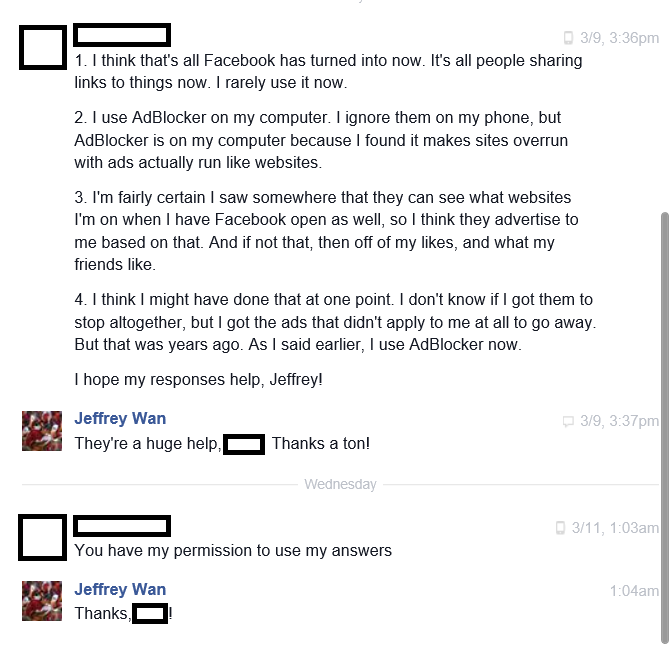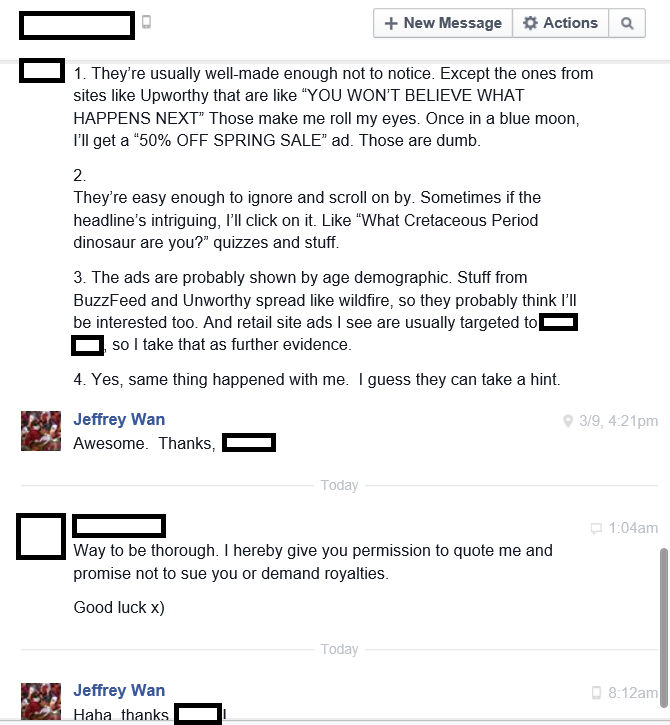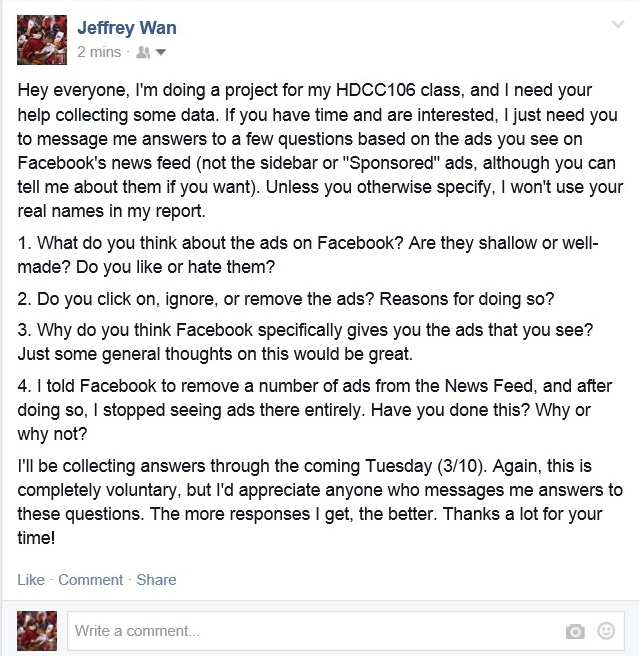It is well known that Facebook, like many websites, shows advertisements on its pages presumably to earn ad revenue. However, recently it has been showing ads on users’ News Feeds as well, and this has become an object of criticism for many people. After hearing many valid complaints about this move and deliberating my research topic, I decided I would look into users’ thoughts and opinions on News Feed ads. To this end, my research questions are: What do Facebook users think about the ads they see and what do they do with them? What does this information tell us about the role of targeted advertising in our online culture?

My method of gathering this information was to first post the following prompt on my Facebook page:
My intention in asking those questions was to collect enough detailed data to draw conclusions on the relationships between users and ads. When I only received eight responses over four days, I was forced to conduct live interviews while asking the same questions. The interviews gave me four extra responses. I made screenshots of the responses I received on Facebook, and I recorded all of my responses in a separate word document. I also removed all identifying information of the responders from both modes of documentation. In this post, I will analyze the responses and discuss notable patterns as well as outliers. Unfortunately, I forgot to ask for permission to quote on my first prompt, and when I asked for people willing to let me quote them, only three gave permission. When I began the experiment, I was fully expecting all of the responders to be hostile or indifferent to the ads on their News Feeds. However, when the survey was done, I had received a surprising variety of opinions on the ads.
Before we look over the results, it’s worth noting that one responder simply didn’t see any ads on their News Feed because they didn’t use Facebook enough. Therefore they couldn’t answer any of my questions. From here we will examine the other eleven effective responses.
First, we will go over the predicted responses: those who disliked and/or ignored their ads. Of those eleven responders, only one explicitly reported ever clicking on any ads. Four people (including the one just mentioned) ignored most ads they saw because they predictably didn’t care enough to delete them, and another four either told Facebook to remove the ads or installed AdBlocker to prevent them from appearing altogether. Finally, ten out of the eleven responders knew that Facebook specifically gave ads to them based on a combination of web activity, pages visited, and geographic location.

Based on the observations so far, the majority of Facebook users seem to know that their ads are targeted towards them. As one responder stated, “It is more effective to have ads tailored specifically to personal interests.” Another responder even expressed discomfort at Facebook using their information to send them ads, so Facebook’s marketing can be seen as an invasion of privacy for some. I can also say that many people simply ignore the ads they see while another, similar percentage of people, actively try to remove them. Precise numbers can’t be estimated due to my small sample size, but my hypothesis was correct with most responders. Most people are not interested in what the ads show them, so I believe the ads don’t affect them much aside from being inconveniences. The most interesting results, though, are the unexpected ones.
One responder noted that they actually liked the ads for their design and didn’t remove them because they wanted to keep them for future reference. At this point I started to gain insight on other sides of advertising. Sometimes ads do help people find products they’re genuinely interested in, and in that case ads would benefit the user, the company, and Facebook. There’s a transfer of power there, just by clicking on the ad. Clicking the ad means giving attention to what is being shown, and the ad therefore can work with the user’s mind to sell a product. Still, even though the ad holds more power with the user’s attention, the user ultimately has agency in whether they follow the ad’s suggestions or leave and go about their day as usual.
Also, while most responders said ads were annoying or shallow, only one said they were actually offended, and that was because the ads were stealing copyrighted work. It’s possible that most of Facebook’s ads are moving away from offensive content like stereotypes or sex appeal, although one responder has said those rare ads still exist. Ads that are offensive, whether through shallow tactics or through defacing what users enjoy, would alienate too many people. We have to examine one last response to get the full picture, though.
The last responder, surprisingly, said that though the ads are annoying, they keep them on because they want Facebook to be free. This response caught me off guard, but it makes perfect sense. I did some research online, and Facebook gets more than 80% of its revenue from advertising (as of 2011). Some people are willing to put up with ads if that’s what it takes to keep Facebook free. It’s understandable that this responder is concerned about removing ads. If most people ignore or remove ads, then Facebook probably earns revenue just by having ads appear on users’ screens. Still, the targeted nature of ads implies that Facebook has motivations for enticing people to click on ads. Facebook’s algorithms try to send ads to those who are most likely to click on them, although there are clearly flaws in the system if the ads are turning many people away.
Something I didn’t expect to turn up was “content mills” like Upworthy and BuzzFeed. As one responder said, “Stuff from BuzzFeed and Upworthy spread like wildfire” partly because of their use of “click-baits,” and while they’re not exactly ads, their method of spreading ideas is reminiscent of ads. Though these sites don’t ever market products, they may have some unsettling implications. Content from “content mills” doesn’t just entice people to click on the link; it subtly makes them agree with some idea it’s promoting. If those tricks are used to advertise a product, targeted ads would become more prolific and convincing. People don’t like to have products aggressively marketed towards them; hiding the product behind an article that “agrees” with the user could be much more effective. When I noted earlier that a successful ad benefits the user as well as the companies, that may be something an ad touts. It would seem as though it’s helping the user. As of right now, ads don’t have the same attracting effect that content mills have, but there is nothing stopping advertisers from making it so. That would likely generate more revenue for Facebook, but then ads would become far more than annoyances for most users.

For the present, Facebook’s targeted ads are its way of generating revenue and keeping the service free. There is a clash of interests though. Targeted advertising, while successful in some instances, can be ineffective or even offensive toward its intended audience. Facebook only focuses on what we seem interested in, and it uses that data to show the ads we’re most likely to click on. For those who ignore or remove ads, the ads are annoyances. For those who use the ads, they can reflect or even shape their interests. There is a reasonable chance that ads can become more effective and insidious, though. For now, my evidence suggests that targeted advertisements, while shallow and annoying, are a necessary tradeoff for a free social network. Beyond generating revenue, the ads may influence some decisions among users, but for many people the ads don’t currently do much. That being said, it is wise to keep an eye on how prolific and convincing the ads are becoming.
